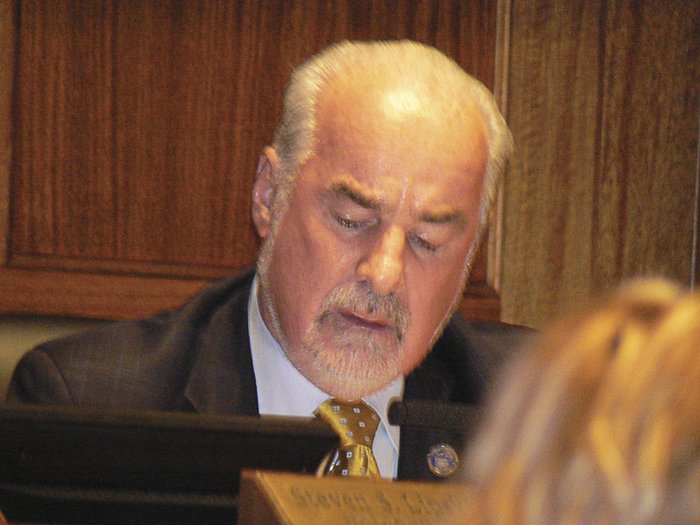By a vote of 5-3-1, the City Council introduced a measure Wednesday night to replace current Council President Peter Brennan with At-large City Councilwoman Viola Richardson, a move spurred by the change in makeup in the council after November’s special election for two at-large seats. The ordinance would give the City Council the ability to elect a new president every two years. At present, a council president is elected every four years, after regularly scheduled municipal elections.
If the proposal is approved at the council’s next meeting, on Jan. 25, Brennan has threatened to file a lawsuit against his colleagues on the council, whom he believes are violating his civil rights. He also said removing him as council president “without just cause” is a violation of his contract with the city and council.
‘Lead with dignity, not with lawsuits.’ – Steven Fulop
____________
Given Brennan’s threat, it is unclear whether the move to oust him as council president – which was introduced by Ward C City Councilwoman Nidia Lopez – will be successful.
On Wednesday, council members Steven Fulop, David Donnelly, Rolando Lavarro, Richardson, and Lopez voted to introduce the ordinance to replace the council president this year. Brennan and his allies on the council, Michael Sottolano and William Gaughan, voted against the ordinance.
Newly-appointed Councilwoman Michele Massey, who was just sworn in last month, abstained from the vote, explaining that as a new representative she needed more information before casting a vote in favor or against the proposal.
“There is not a person on this council who knows more what it feels like to be on the losing side of a vote than I do,” Fulop said. “But at no point when you’re on the losing side of a vote do you say, ‘Well, I’m going to sue and cost the taxpayers money.’ Part of democracy is that you go with the majority. None of these seats on the council is a birthright. None of these are God-given. Elections do have repercussions. If the majority of the council says, ‘We’d like to explore a different option,’ the result of that shouldn’t be, ‘Well, I’m going to sue because this is my seat.’ Lead with dignity, not with lawsuits.”
The council voted Brennan to be president after the September 2010 resignation of Mariano Vega, who had been the previous governing body president until he pleaded guilty to corruption charges. Brennan’s term ends on June 30, 2013, after which the City Council is expected to hold its next reorganization meeting on July 1, 2013.
The Hoboken example
Lopez, however, noticed that other cities – including nearby Hoboken – have successfully switched their council leadership between regular election cycles.
Last year, Hoboken revised its local laws to allow a change in its City Council leadership. After the November 2010 elections, allies of Mayor Dawn Zimmer lost control of the Hoboken City Council. The council wanted to make Councilwoman Beth Mason – a Zimmer opponent – the new council president.
To do this, the city found that it would have to change its municipal code to allow such a change, which the council did. Mason became council president, a position she held until the May 2011 election again altered the makeup of the council and returned the council majority to Zimmer’s supporters. The mayor’s supporters ousted Mason and made Zimmer ally Ravi Bhalla the new council president.
Matsikoudis: ‘A violation of due process’
However, Jersey City’s Corporation Counsel Bill Matsikoudis informed the council last week that replacing Brennan as council president without just cause before the end of his term could violate his constitutional rights and could have other ramifications.
In a Jan. 9 letter addressed to the City Council, Matsikoudis wrote that “terminating Council President Brennan’s term without cause and without a hearing will likely be deemed a violation of his constitutional right to due process. If Council President Brennan were to successfully challenge the proposed ordinance on constitutional grounds, he may very well be entitled to damages and attorneys’ fees.”
Any damages and attorneys’ fees that might be awarded to Brennan, Matsikoudis emphasized Wednesday, would come out of the city’s general fund and would have to be paid with taxpayer money.
While Matsikoudis did not mention Hoboken specifically, he did point out that under Jersey City’s charter the council holds its reorganization meetings every four years, while other municipalities hold theirs annually. Hoboken is among the cities that traditionally reorganizes its council every year.
After reviewing Matsikoudis’ legal opinion, Lopez said, “I read a lot of ‘it’s possible.’ I read a lot of ‘maybes.’ There was nothing in here that was a definitive ‘yes’ or ‘no.’ ”
The intent of the ordinance, she added, is to make the council more reflective of residents’ opinions.
Richardson, who was elected to her at-large seat in November after serving as Ward F councilwoman for 10 years, said she was “humbled” by the introduction of the ordinance and will try to lead the council as best she can, if selected as president.
Although there was no formal public hearing on the ordinance Wednesday, several residents supported Lopez’s proposal.
“Clearly, they [the council majority members] think they have the authority to make a change midterm. I disagree,” said Brennan. “I’m willing to go to court to let the court decide.”
E-mail E. Assata Wright at awright@hudsonreporter.com.
